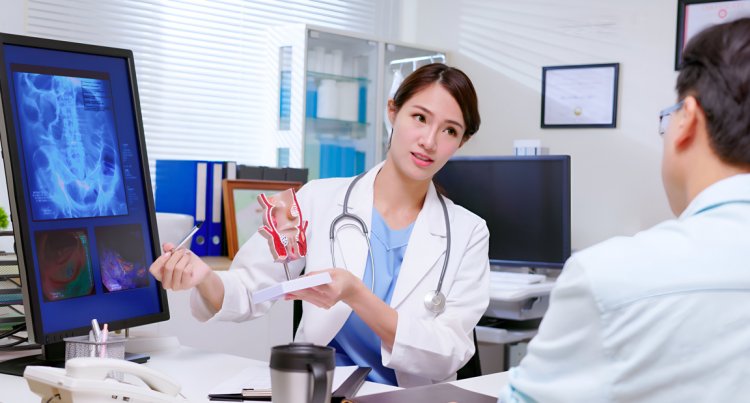Navigating Polyps: Types, Causes, Symptoms, and Treatment
Polyps are abnormal tissue growths that can develop in various parts of the body. While some polyps are benign, others have the potential to become cancerous if left untreated. In this comprehensive article, we will delve into the different types of polyps, their causes, symptoms, diagnosis, and treatment options. #Polyps #Healthcare #Medical #ColorectalPolyps #NasalPolyps #EndometrialPolyps #GastricPolyps #CervicalPolyps #Diagnosis #Treatment #MedicalCenters #Clinics #UnitedKingdom #Turkey #HealthTips #Wellness #Prevention #Awareness #HealthEducation #Colonoscopy #Hysteroscopy #NasalEndoscopy #UpperEndoscopy #PolypRemoval #HealthcareProfessionals #PatientCare #MedicalAdvancements

Types of Polyps
Colorectal Polyps
These are growths that occur in the colon or rectum. They are commonly classified into three main types: adenomatous polyps (adenomas), hyperplastic polyps, and inflammatory polyps.
Nasal Polyps
Nasal polyps are soft, noncancerous growths that develop in the lining of the nasal passages or sinuses. They can cause symptoms such as nasal congestion, loss of smell, and facial pain or pressure.
Endometrial Polyps
These are growths that occur in the lining of the uterus (endometrium). Endometrial polyps can cause abnormal uterine bleeding, infertility, or recurrent miscarriages in some cases.
Gastric Polyps
Gastric polyps are growths that develop in the stomach lining. They are usually benign, but some types may have the potential to become cancerous over time.
Cervical Polyps
Cervical polyps are finger-like growths that occur in the cervix, the lower part of the uterus. They often cause abnormal vaginal bleeding, especially after intercourse.
Causes of Polyps
The exact causes of polyps are not always clear, but several factors may contribute to their development:
- Genetics: Some people may inherit a predisposition to develop certain types of polyps.
- Chronic Inflammation: Chronic inflammation in the affected area, such as in the colon or sinuses, may increase the risk of polyp formation.
- Dietary Factors: A diet high in fat and low in fiber may increase the risk of developing colorectal polyps.
- Hormonal Factors: Fluctuations in hormone levels, particularly estrogen, may play a role in the development of certain types of polyps, such as endometrial polyps.
Symptoms of Polyps
The symptoms of polyps vary depending on their location and size. Some common symptoms include:
- Rectal bleeding or blood in the stool (colorectal polyps)
- Changes in bowel habits, such as diarrhea or constipation (colorectal polyps)
- Nasal congestion or difficulty breathing through the nose (nasal polyps)
- Facial pain or pressure (nasal polyps)
- Abnormal uterine bleeding (endometrial polyps)
- Infertility or recurrent miscarriages (endometrial polyps)
- Abdominal pain or discomfort (gastric polyps)
- Abnormal vaginal bleeding (cervical polyps)
Diagnosis of Polyps
Polyps are often diagnosed through various imaging tests and procedures, including:
- Colonoscopy
- Nasal Endoscopy
- Hysteroscopy
- Upper Endoscopy
Treatment of Polyps
The treatment of polyps depends on their type, size, and location. Some common treatment options include:
- Polypectomy
- Medication
- Hormonal Therapy
- Surgery
Polyps are abnormal tissue growths that can occur in various parts of the body, including the colon, nasal passages, uterus, stomach, and cervix. While many polyps are benign, some have the potential to become cancerous if left untreated. Early detection and treatment are crucial for preventing complications and improving outcomes for individuals with polyps. If you experience symptoms suggestive of polyps, such as rectal bleeding, nasal congestion, abnormal uterine bleeding, or abdominal pain, it is important to consult with a healthcare professional for further evaluation and management.
Centers or Clinics in the United Kingdom
- St. Mark's Hospital, London
- The Royal National ENT Hospital, London
- Manchester Royal Infirmary
- Addenbrooke's Hospital, Cambridge
- Birmingham Women's Hospital
Centers or Clinics in Turkey
- Memorial Hospital, Istanbul
- Acıbadem Healthcare Group
- Liv Hospital, Ankara
- American Hospital, Istanbul
- Medical Park Hospitals Group

Discover Coupoly's exclusive Medical Concierge Service, connecting you with renowned doctors and clinics, whether in the UK or abroad.
Get in Touch
Disclaimer:
The information provided in this article is for educational purposes only and should not be considered medical advice. If you have any health concerns or are experiencing symptoms, it is important to consult with a healthcare professional, such as a doctor or clinic, for proper diagnosis and treatment. Always seek the advice of your doctor or other qualified health provider with any questions you may have regarding a medical condition. Do not disregard professional medical advice or delay in seeking it because of something you have read in this article.
What's Your Reaction?





















